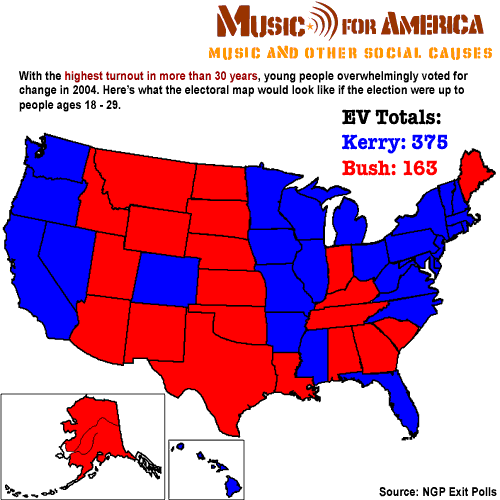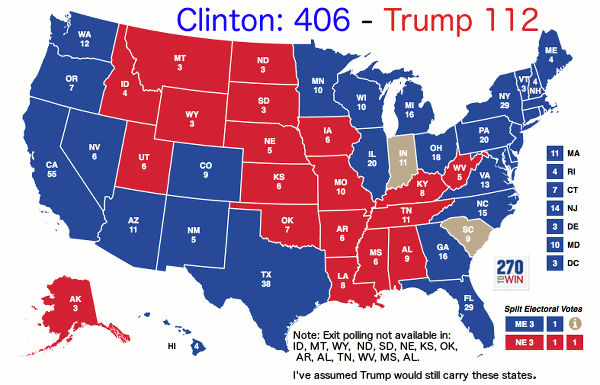2016 Reminds Me of 2004
What a gutpunch. It's shades of 2004 (more on that later), but also worse for so many reasons.
Complex systems don't fail due to a single cause. They're always running in some sort of degraded mode — there is no perfect union — and catastrophic failures have multiple vectors, often cascading. Assigning blame after the fact can easily turn into an exercise in emotional release, the desire to identify a specific "root cause." Even in hindsight, this is more often storytelling and internal politics than anything else.
Still, without retrospectives, we cannot hope to improve.
I don't think it's productive to try and blame voters, or even non-voters. Where does that really lead in a democracy? This kind of thinking is always tempting, and carries a bitter tautological truth that a democracy delivers the government people "deserve," but it must also be rejected out of hand. It is a poisonous form of fatalistic elitism, a surrender. No.
I also don't really think it's right to blame Lena Dunham, Martin Sheen, or any other celebrity figurehead, even if you think their participation was counterproductive. They're amateurs, and maybe they're annoying or insufferable or distracting, but voting is the least we can do, and they were trying.
Ultimately, experienced professionals in control of a top-down campaign organization decided how best to persuade and motivate voters, where and how to deploy which surrogates, whether or not to trust an algorithm vs human reports from the field, etc. These people ostensibly do this for a living. They had one job, and they blew it. If there's blame, that's where I lay it.
Like all of us peasants, they thought they had it in the bag, popping bottles on the campaign plane early on election day. Of all the extraordinary anecdotes to come out in the aftermath, that really says it all. I believe the extremity of the post-election freakout (which is really something) is because the result was such a shock. The psychological reaction that subconsciously occurs to shield the ego from shame and guilt has kicked in for a great many people, which is slowing down our ability to process events.
But what's done is done. The question is, what can we learn from all of this?
I think one conclusion to draw is that without a compelling message, and messenger, it's hard to win elections. This was a practical experiment in how far one can go on "not the other guy," as a rationale and unfortunately it's a costly lesson. As Ezekiel Kweku put in his excellent recap:
The lesson we should draw from Clinton’s loss is not that white supremacy is unbeatable at the polls, but that it’s not going to beat itself. White people are not going to instinctively recoil from racist appeals, and neither are people of color going to flock to the polls to defeat them. If the Democratic Party would like to keep more Donald Trumps from winning in the future, they are going to have to take the extraordinary step of doing politics.
A campaign that has few contact points and interactions with base voters may risk being badly surprised by the state of their support come election day. This was, in retrospect, a pretty lazy campaign. Light on traditional methods of voter contact. The ground game was weak, as Daniel Sholzman recounts in his experience from New Hampshire:
What I saw in Dover was too much campaign spending and too little party building, a campaign-in-a-box imported from outside, flaunting best practices but tied too weakly into the community, mobilizing too little and too late. It was the Hillary Victory Fund event made flesh.
Hard work is hard, but again that's the job. They are supposed to be doing politics for a living, and if they're not going to do it, or are crap, maybe the party should hire some other people for a change.
It's also my fault, and maybe yours.
Anytime an election comes down to a few thousand votes in a few key states, every partisan has to look in the mirror and take some responsibility. Even if the professionals running the show are incompetent — and it's safest to generally assume that they will be — that's no excuse for conscious and engaged citizens not to try and make an impact. Again, voting is the least we can do.
All I did was make a crappy website that I didn't bother promoting or revising very much because by the time I was done I figured they had it in the bag. That was my mistake too.
I have no illusions that I alone could have swayed the outcome, but I take responsibility for my failure to influence pretty much anyone, and I think it's likely there were hundreds if not thousands of others like me, people who got complacent, who weren't organized, activated, engaged. Collectively, it's possible we could have made the difference.
Shades of 2004
I worked 2004 as my full-time job, so was a lot more engaged in the details, and I know it's a trite thing to relive one's 20s — just another aging hipster doing Glory Days — but there are a lot of parallels to me. And I've got some numbers too.
While HRC won the popular vote by a wide margin, this is because of a crushing margin of victory in California and long term demographic trends in Texas, neither of which delivered any extra electoral votes. Outside of those two states, and especially in other close battlegrounds, her campaign outcomes are very close to Kerry/Edwards.
Clinton/Kane's tally in most of the swing states is also markedly down from Obama/Biden. My read: their campaign regressed to the mean of milquetoast Democratic technocrats.
More importantly, they actually under-performed the '04 numbers in the decisive upper midwest:
| State | JFK 2004 | HRC 2016 |
|---|---|---|
| PA | 2,938,095 | 2,926,441 |
| OH | 2,741,167 | 2,394,164 |
| MI | 2,479,183 | 2,268,839 |
| WI | 1,489,504 | 1,382,536 |
Those who claim the historical size of the Clinton/Kane popular vote as an achievement are engaging in sophistry, patting themselves on the back. Again, looking back to what changed since 2004, most of their large vote haul relative to Kerry/Edwards comes from gains in the following states:
- +2M in California
- +1M in Florida
- +1M in Texas
- +500K in North Carolina
- +500K in Virginia
- +300K in Colorado
Nationally there are about 20 million more voters now than there were in '04, and those are all states where the voting age population growth is concentrated. Only Virginia and Colorado flipped from red to blue, which is not enough to account for losing Pennsylvania, Michigan, and Wisconsin, especially considering Kerry's map was already a loser.
And for me, when I take a step back, the vibe of the campaigns feel fairly similar.
Things I remember from 2004 are having to grit my teeth through a lot of Kerry public speaking. Feeling shut out from a top-down campaign. I remember how the media ate up Rove's Swift Boat nonsense. I remember how bizarre and jingoistic the RNC was, and how callous as well. This was in the middle of a war, and they handed out purple bandaids, remember?
It feels worse because of the shock, and because the incoming Trump administration seems somehow more awful than the Bush/Cheney regime, or at least more unpredictable, unknown. Back in 2004 I always knew Kerry was likely to lose, and Bush had already done four years in office so we were accustomed to his presence. This is quite a bit more of an adjustment.
Whither From Here
What is to be done? Well, harkening back to my own experience, I hope the Democratic Party takes the opportunity to turn over a new leaf. I remember in the aftermath of the Kerry/Edwards failure, my man Howard Dean won an insurgent campaign for DNC chair, promptly invested heavily in state and local parties, and helped win a resounding congressional reversal in '06 that set up Obama with a unified government in 2008.
The thing about Dean is that he was no ideologue, but he understood the urgency of the moment. The practical need to both change moderate minds, engage the apathetic, and motivate the base; to build power in order to win. He's politically cut from cloth of the center-left liberal elite, but he had the courage to take risks, and the conviction to know there's a winnable fight in all 50 states. We need that again.
I personally think the Democratic Party needs a shot in the arm from an ideas standpoint — triangulation, neoliberal economics, and pop-culture pluralism are not enough — but even more so they need an infusion of vitality, of fighting spirit. They need to focus on converting citizens and then winning elections starting from the bottom up. Hopefully that will come. If it does, change can come quicker than you might think.
Right now a lot of people are still dealing with shock, subconsciously recoiling and avoiding processing what's happening, retreating into fantasy, suffering in denial, or even hiding behind reaction formation defense mechanisms that cause them to lash out at ghosts, jump at shadows. That's ok for now, healing takes time and everyone should look out for their mental health, but it's going to be time to snap out of it soon. People who want to call themselves professionals should probably get their shit together.
To recap, we need:
- New Leadership: without accountability there can be no change.
- New Appeal to Citizen Interest: simple, clear, material reasons for people to vote D that resonate with their lived experience, expressed directly and consistently.
- Broad/Mass Organizing: do the work to field candidates and win elections, especially retaking state legislatures in advance of 2020 redistricting.
There's still hope in the future. In 2004 my colleagues and I made this map to show that even if we didn't swing the election our work, at least, might pay off in the long run:

Here's a redux of the same idea using exit polling from 2016:
This isn't "demographics are destiny" happy talk. Obama did even better than the above because he was a better candidate, and his campaign was better at doing politics. Young voters can be lost, both to another message, and through disengagement. However it shows that there's a potential for things to be different in the future. Texas, baby.
Most importantly, please keep in mind there is no referee or higher authority to appeal to for the next four years. There is no deus ex machina that will deliver a happy ending. It's quite possible that the Democratic Party, in an act of cultish cognitive dissonance, decides to double-down on their cadre of fail-consultants for another cycle or two, or actually breaks apart completely before realigning.
In short, there's nobody riding to the rescue. It's just us, little dog. We're at the crossroads. Who's got the nocks?

